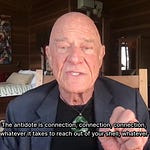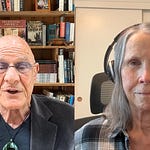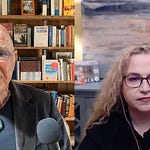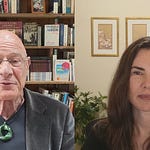Dear Listener,
This week I am writing with a heavy heart. Teen suicide rates have surged by 29% over the past decade. Each year, thousands of precious young lives are lost this way, leaving countless grieving families and communities.
This chilling trend hit home for my recent guest Amy McGuire, J.D., Ph.D. - the founding director of the Ethical Legal Implication of PSychedelics in Society (ELIPSIS) program. Dr. McGuire is also a Professor of Biomedical Ethics at Baylor College of Medicine, where she serves as Director of the Center for Medical Ethics and Health Policy.
She receives research funding from the National Institutes of Health and is. In 2022, she gave a TEDx talk titled “Can Creating Moments of Meaning Improve Mental Health?”
This question is more urgent than ever.
In her talk, she shares that her between her three sons and two of their friends, they had an alarming 9 friends who had passed in their late teens and early 20s. The causes ranged from overdoses and accidents to suicide. This shocked Amy as a parent. But her sons accepted it solemnly as a common occurrence among their peers.
What does it say about our culture when even advantaged youth feel such a lack of meaning and purpose that they turn to narcotics, reckless behavior and suicide? As Amy recounted in our conversation: “I realized that for a lot of young people, there's just this sense of a lack of meaning in their life.”
We’ve normalized deadly prescription medications. They’re overprescribed, overdosed, and overlooked. Yet psychedelics with promising mental health potential remain both illegal and taboo. Why? Partly because perpetual prescriptions make billions for big pharma, while psychedelics taken occasionally can provide meaningful awakenings with long-lasting effects.
Let me be clear - psychedelics are not a panacea, especially not for young people. Their misuse holds risks. Amy worries that many will turn to irresponsible use of psychedelics while “chasing that feeling” of transcendence, without doing the hard work to integrate insights into everyday living.
But our standards seem warped when doctors hand out benzodiazepines like candy while politicians continue demonizing psychedelics that are advancing in clinical trials. Neither deserves reckless access, but both warrant thoughtful oversight.
One thing we can all agree on is the importance of human connection and time in nature for mental health. Loneliness kills - we need each other.
I call on all who are willing to take one simple yet powerful action: have a compassionate conversation with a young person today. This is no easy task, but complacency and denial only enable our youth suicide epidemic to fester in silence. By discussing it openly and taking a stand for young lives, we can start reversing the trend through human connection.
Please listen and share this vital conversation on psychedelic medicine, youth mental health and the search for meaning.
Golden light,
Dr. Richard Louis Miller
Watch:
Key Points:
Why Richard believes community is important (0:00-2:30)
How psychedelics may help address the mental health crisis (2:30-5:42)
The Prevalence of Mental Health Issues (5:43-11:33)
Why the rise in anxiety and depression is unsustainable (5:43-8:12)
How lack of connection contributes to the problem (8:13-11:33)
Why transparency about psychedelic risks is vital to protect participants and advance the field ethically (11:34-14:27)
How certain leaders justify unethical actions through "spiritual bypassing" and "guru syndrome" mentalities (14:28-18:14)
The Therapeutic Potential of Psychedelics (18:15-26:47)
Why more research is still needed on optimal protocols (18:15-21:42)
How decriminalization may actually hinder understanding of proper medical use (21:43-26:47)
Issues Around Recreational and Enhancement Use (26:48-35:39)
Why backlash often meets those who raise concerns about adverse effects or problems in the community (26:48-31:13)
How lack of government guidelines leaves users uninformed and at risk (31:14-35:39)
The Deaths of Young People and What They Reveal (35:40-46:13)
Why even privileged youth feel a lack of meaning (35:40-39:42)
How denying vulnerability prevents solutions (39:43-46:13)
Building Connection and Community (46:14-58:51)
Why integration practices are key to sustaining benefits (46:14-52:54)
How communities can come together around mental health (52:55-58:51)
Closing Thoughts (58:52-1:02:08)
Why optimism coupled with action is vital (58:52-1:00:58)
How Houston weathered the pandemic (1:00:59-1:02:08)
Links/Resources:
MAPS - Multidisciplinary Association for Psychedelic Studies
Rick Doblin - Founder of MAPS
Seeking Psychedelic Testimonials: The Good, the Bad, and the Ugly.
We are currently looking for first-hand accounts of adverse effects of psychedelics—from ‘bad trips,’ to unwanted physiological complications, to abusive practices by guides, therapists, and shamans.
The interviews from this series will go into a forthcoming book on the topic—perhaps the first book its kind.
Please contact me if you would like to be interviewed.
NOTE: The podcast is always freely available thanks to our paid subscribers. Please share this post to show your support for transparency. The following transcript distills the key points from this show into a condensed form. It is meant as a reference - listen to the full episode for an accurate rendition of the conversation.
Transcript
The Prevalence of Mental Health Issues (5:43-11:33)
Dr. Richard Miller: Our guest today, Dr. Amy McGuire, is actively working towards addressing this issue. Dr. Amy McGuire is the Leon Jaworski Professor of Biomedical Ethics and Director of the Center for Medical Ethics and Health Policy at Baylor University in Texas. Welcome to Mind, Body, Health, and Politics. Thank you for joining us, Amy. What are you currently focused on in your work? What is your primary area of interest?
Amy McGuire: Well, I mean, the work we do at Baylor College of Medicine focuses on ethical issues in today's changing world of biomedicine and biomedical research. There's a lot at the frontier of how we think about health and illness. One thing that's been front of mind for me is the mental health epidemic we're in. It's partly due to isolation during the pandemic. But other factors feed this epidemic of suffering.
Dr. Richard Miller: Am I right to call this an epidemic of anxiety and depression?
Amy McGuire: We've seen a huge increase in anxiety and depression population-wide. Before the pandemic, around 11% had clinically significant symptoms. During the pandemic, it rose to 40% or more. Adam Grant wrote a great New York Times piece about those not clinically anxious or depressed but still indifferent - lacking motivation and enthusiasm - he called it "meh."
Dr. Richard Miller: "Meh," it's an interesting word. To me it's like the French existentialists' "sickness unto death" - a dangerous existential boredom, verging on depression.
Amy McGuire: Yeah, so even if not caught in clinical evaluations, "meh" is unhealthy. We should address what's going on.
Dr. Richard Miller: Well, the 40% figure is dramatic. Is that level of mental health symptoms sustainable for a culture?
Amy McGuire: Certainly not healthy for culture or individuals. Efforts over recent years try to address this. More is needed at individual and public health levels. It’s now a public health situation needing systemic culture change towards healthier living and mental health.














